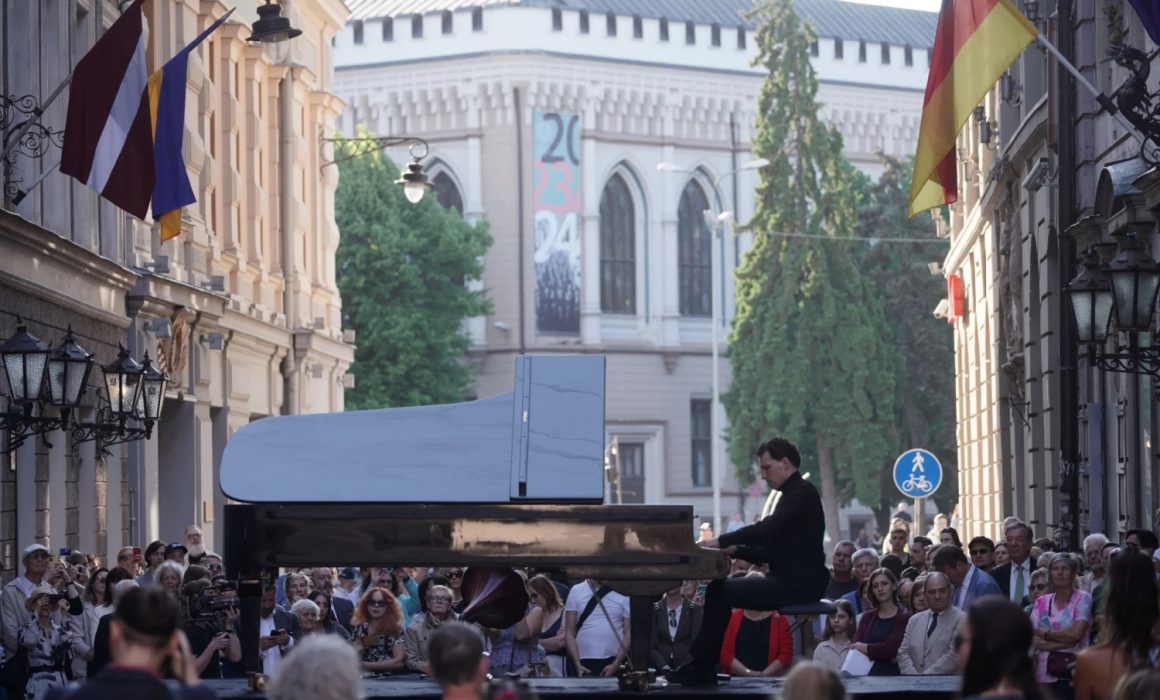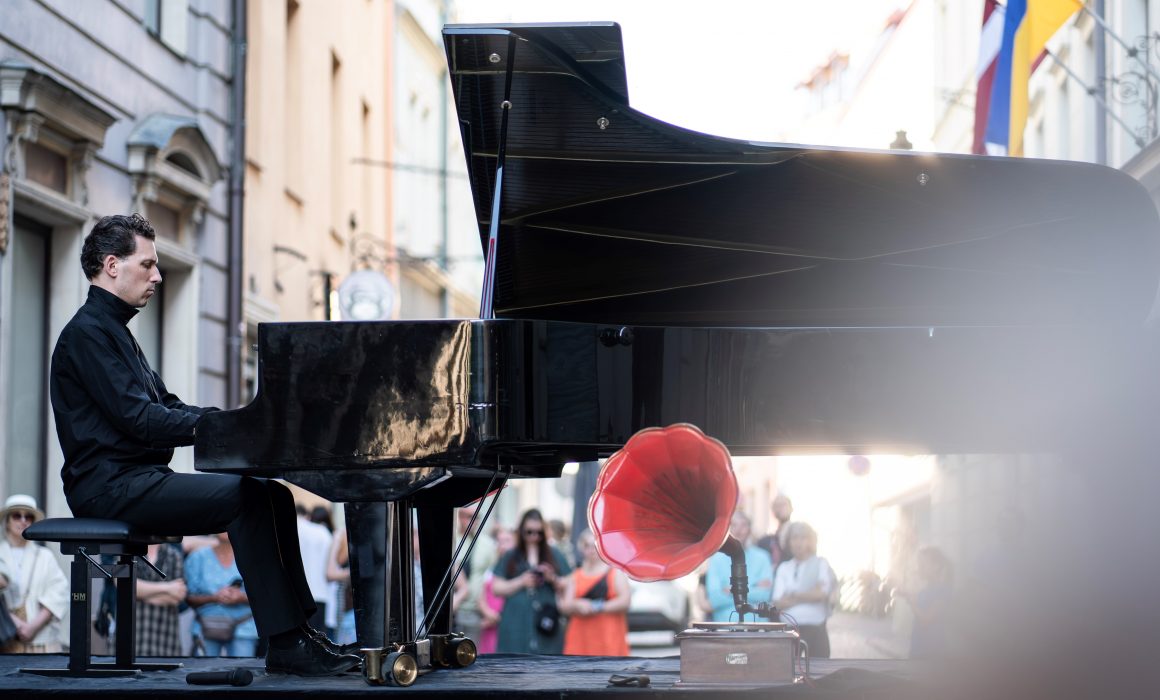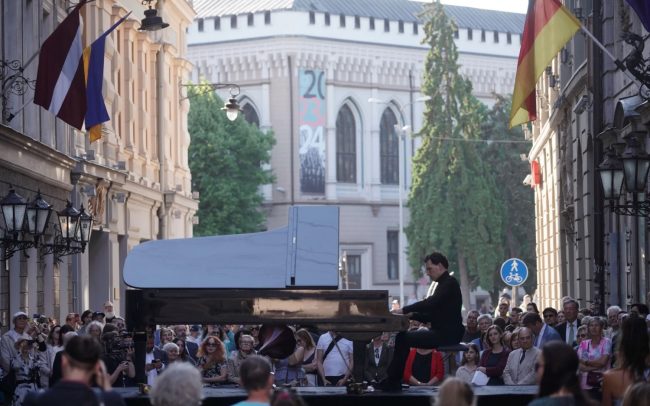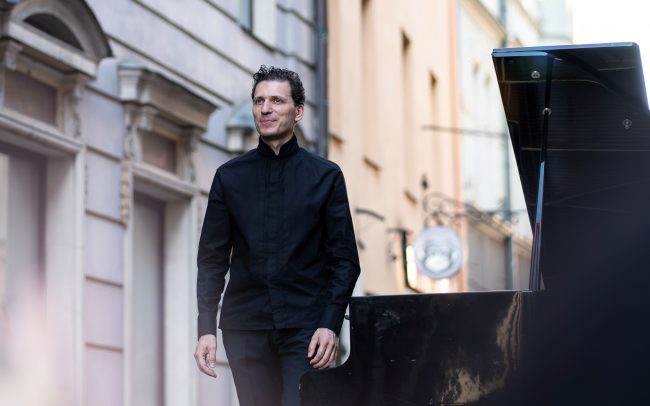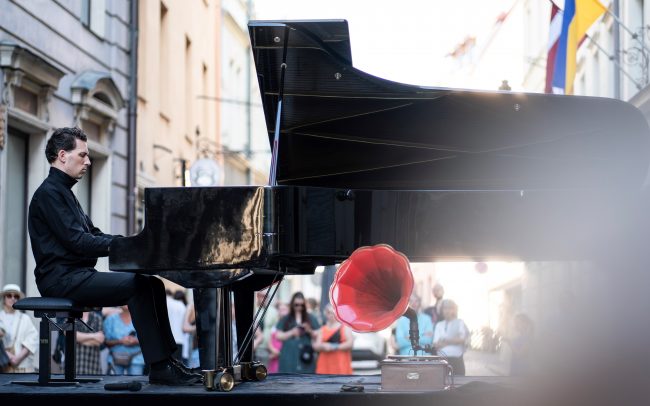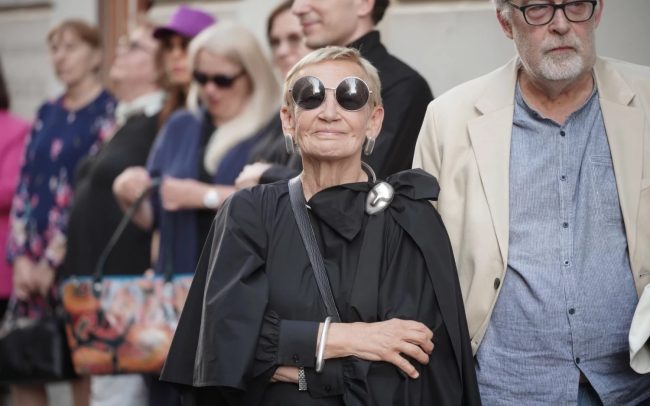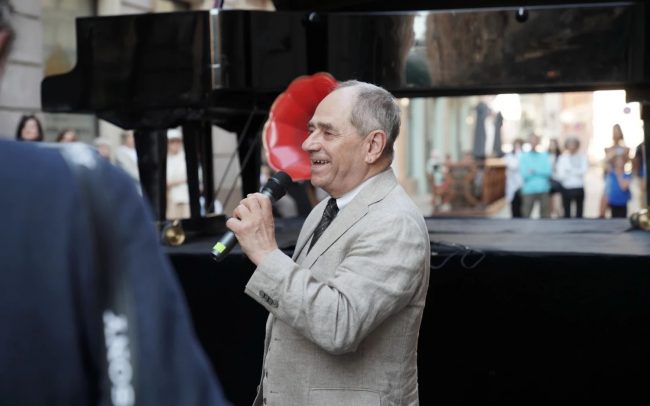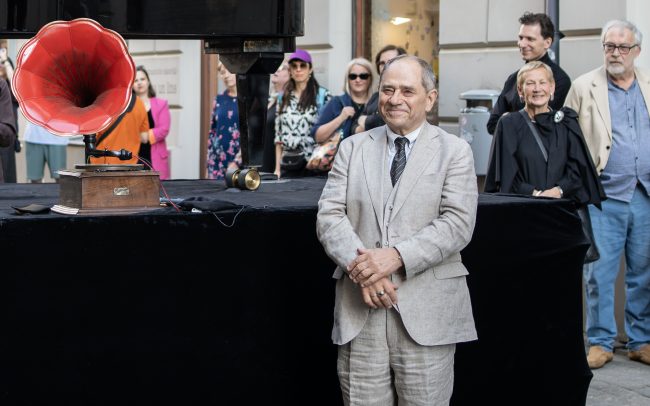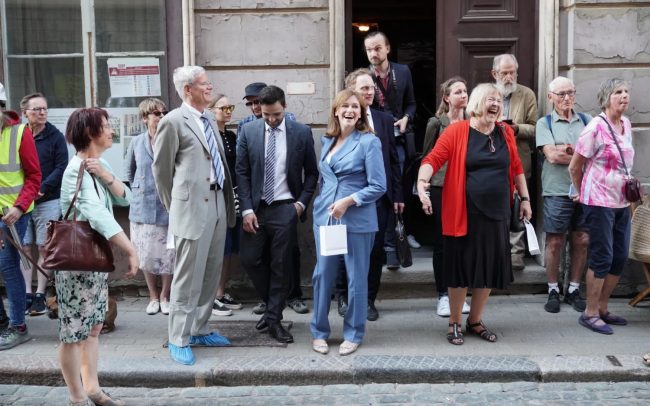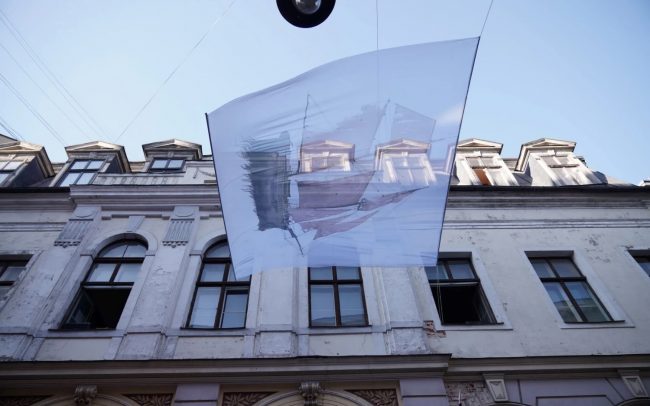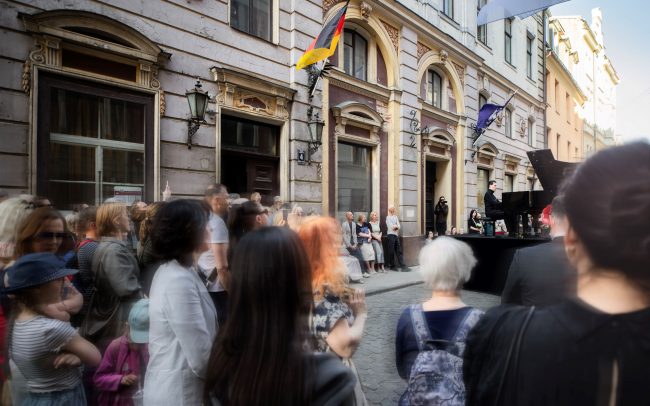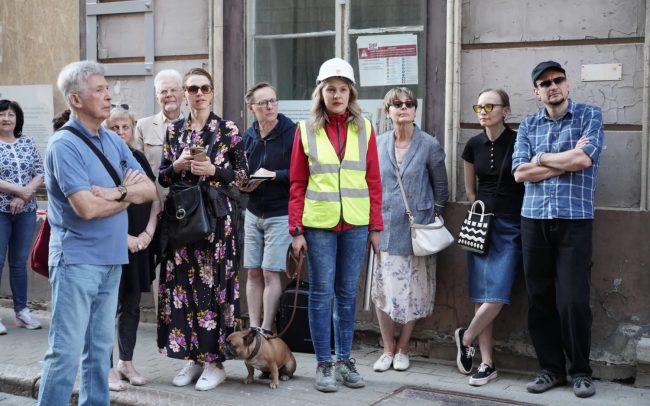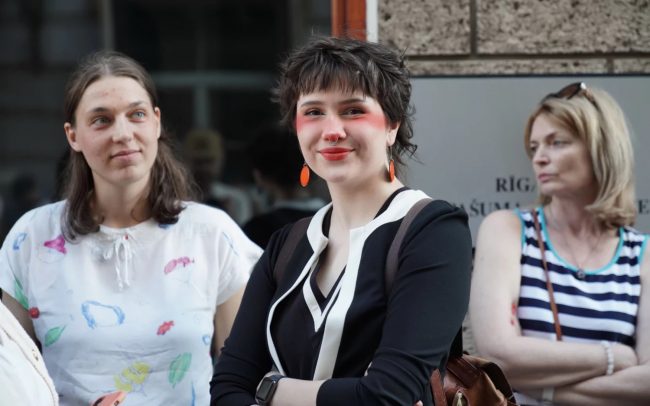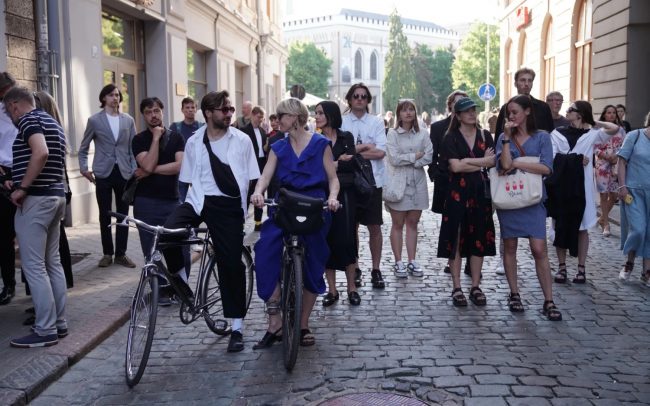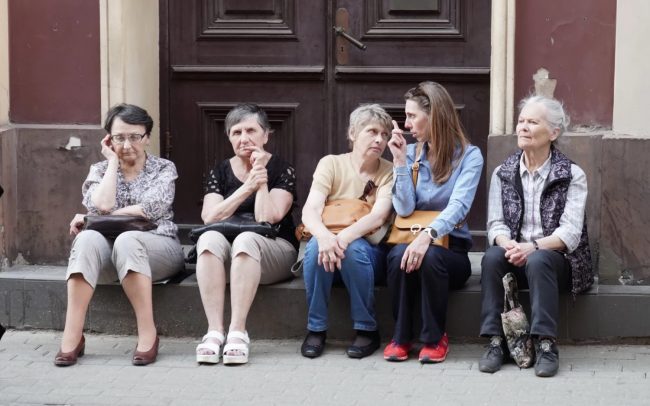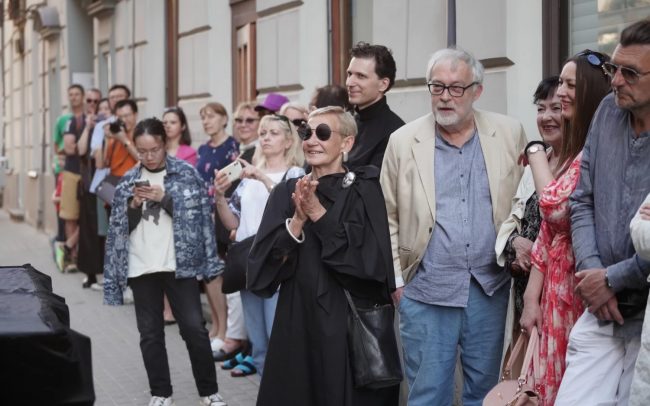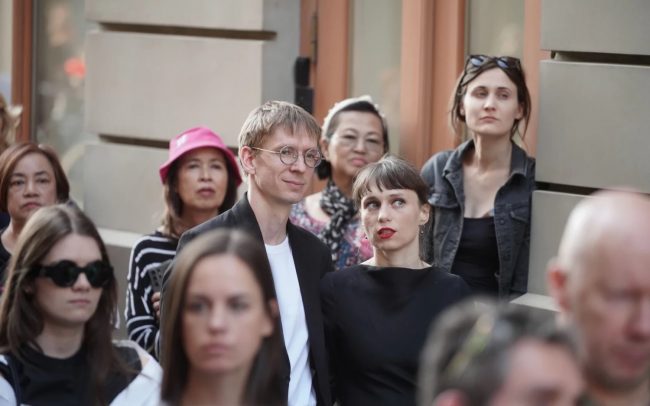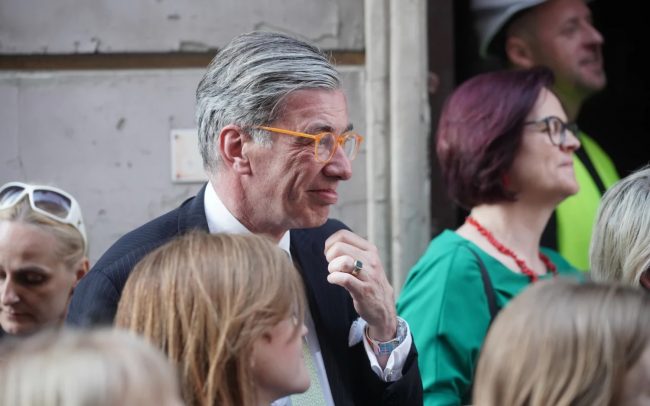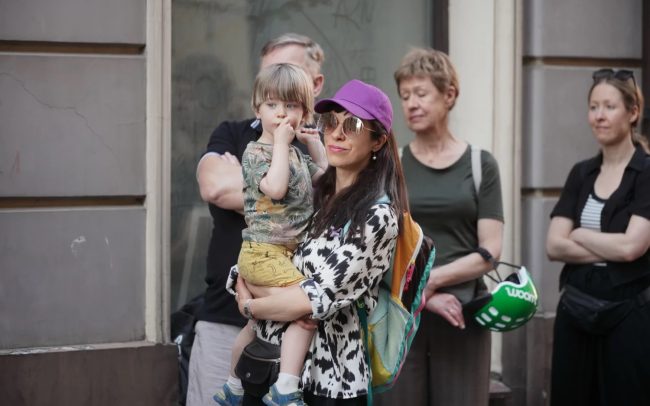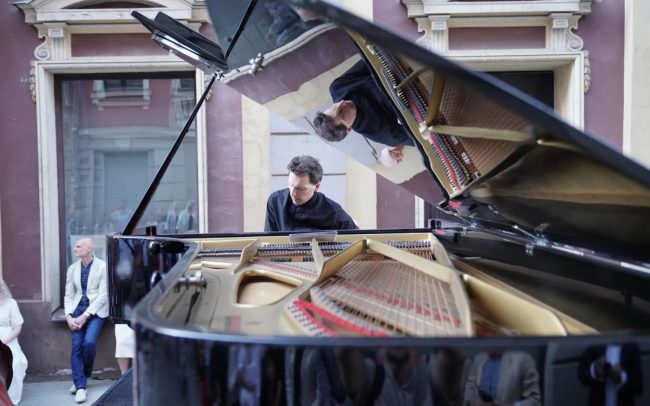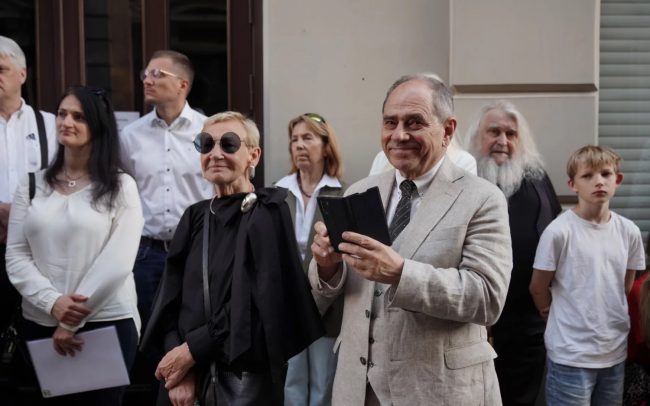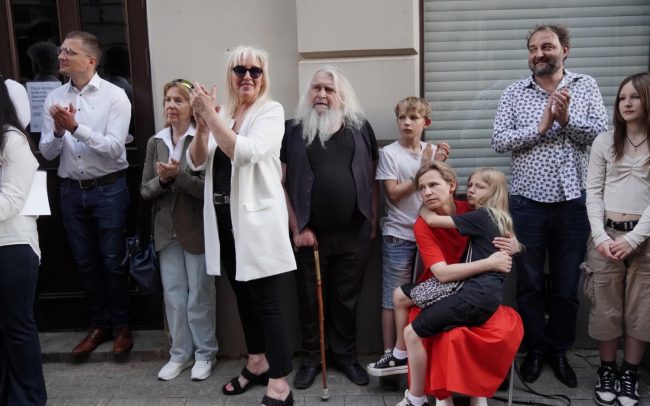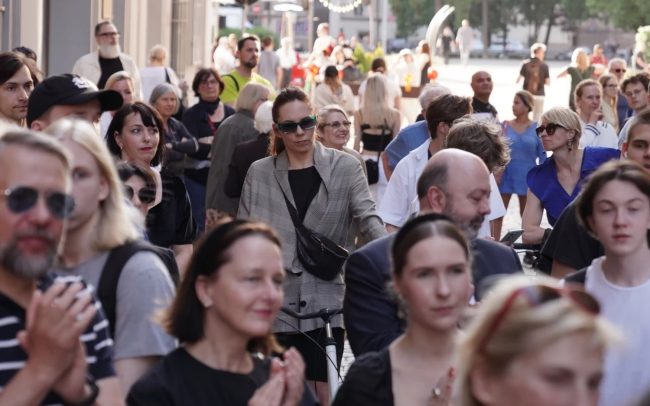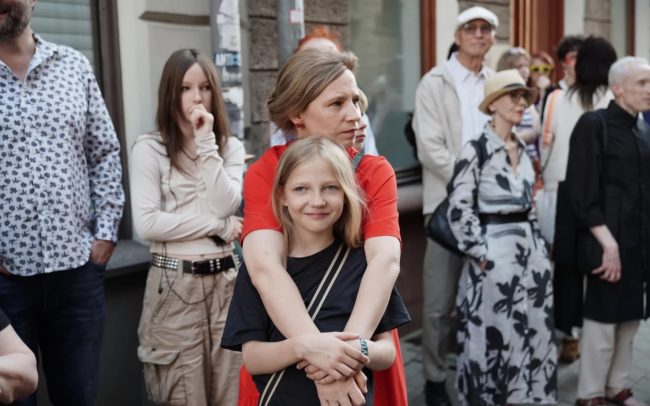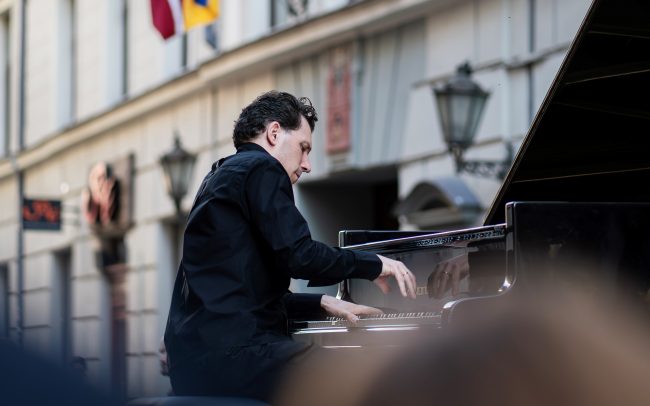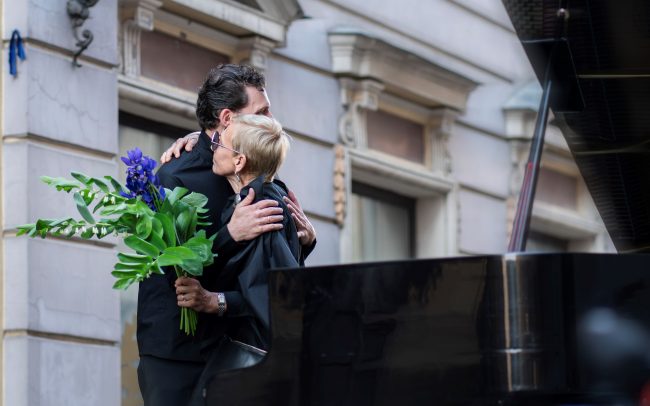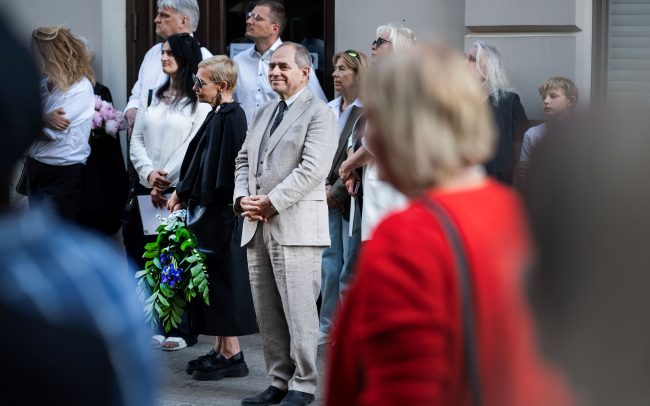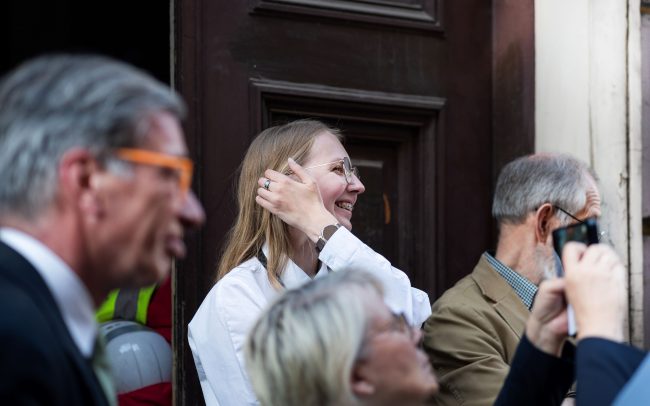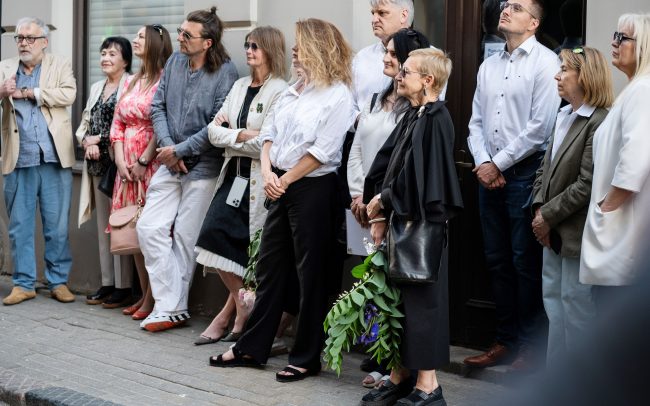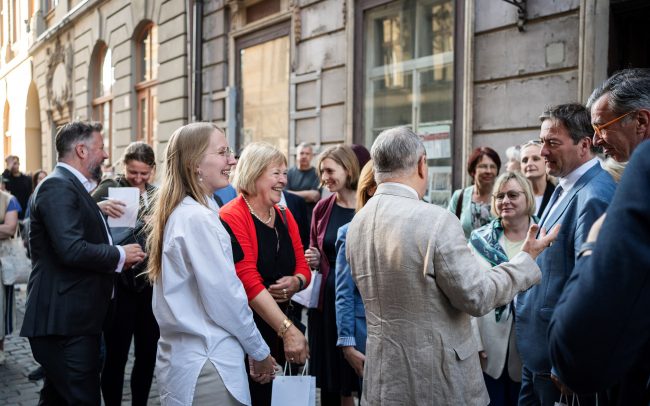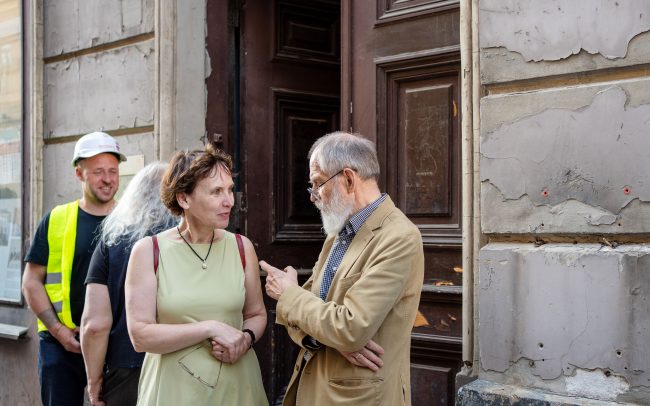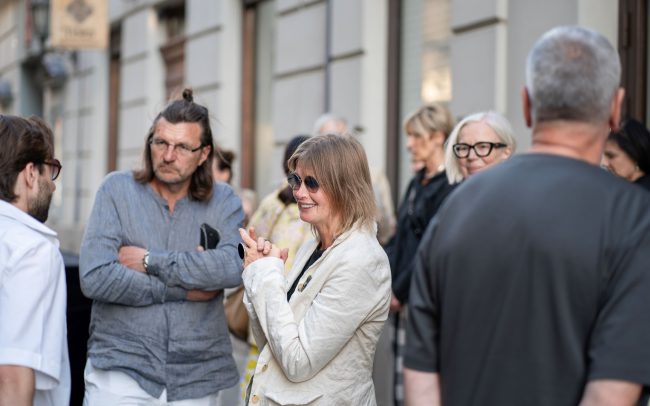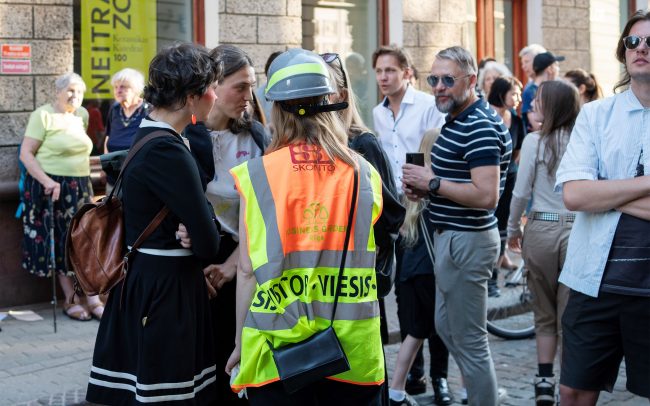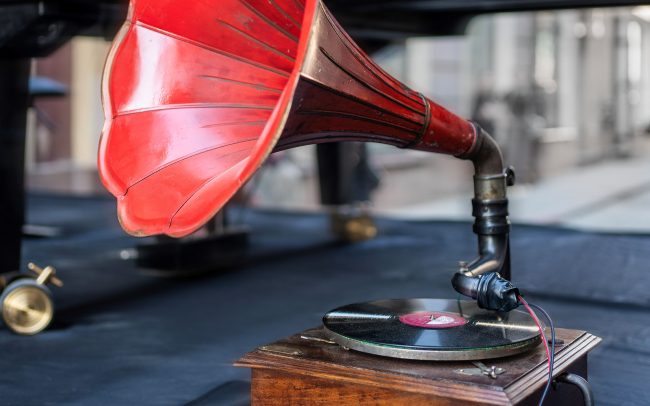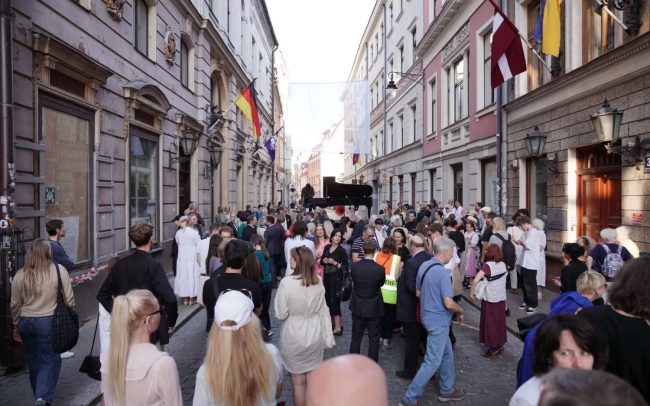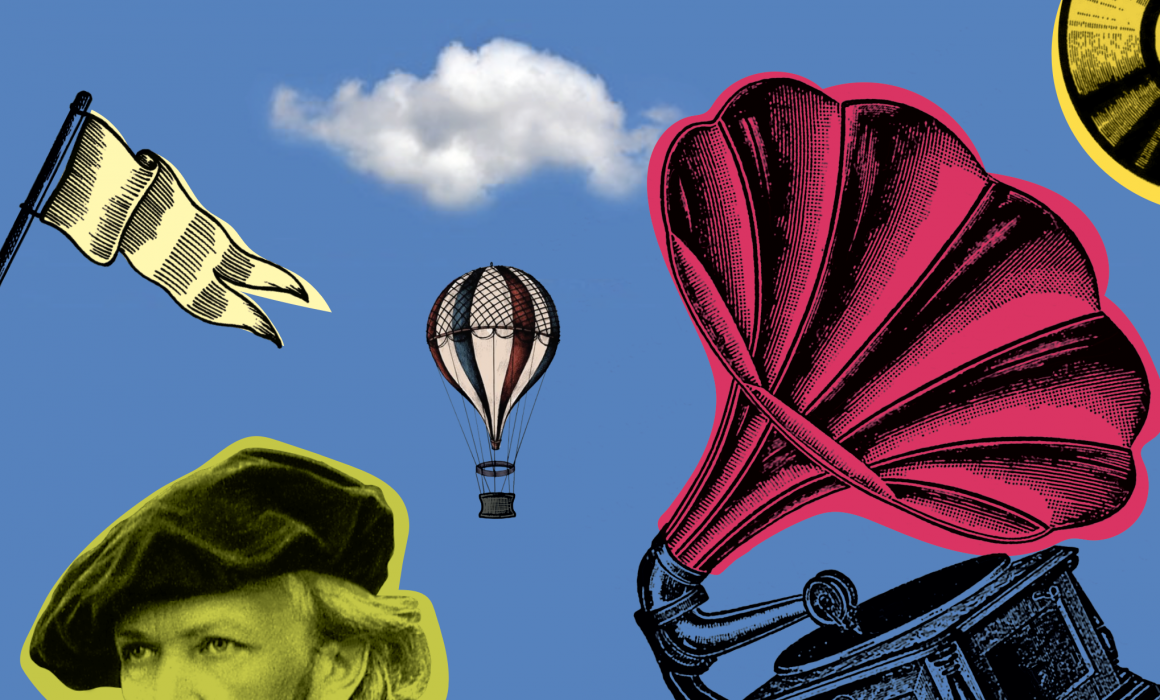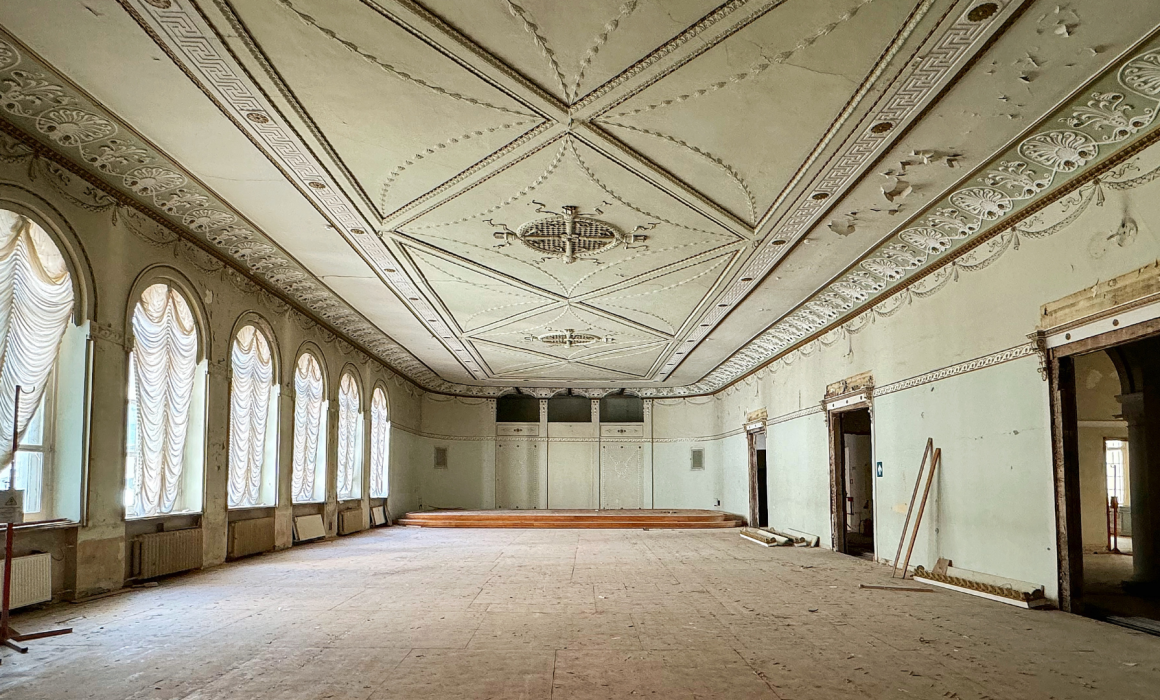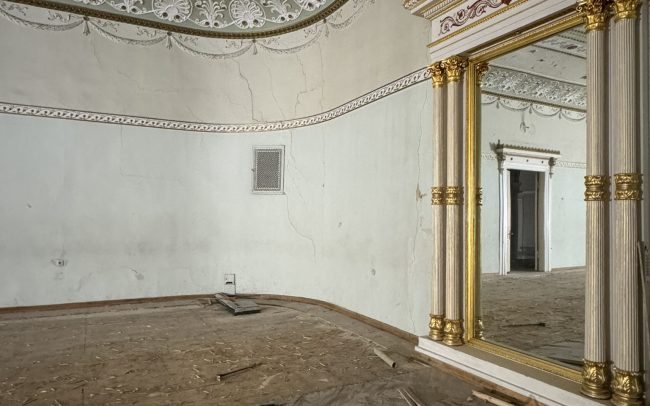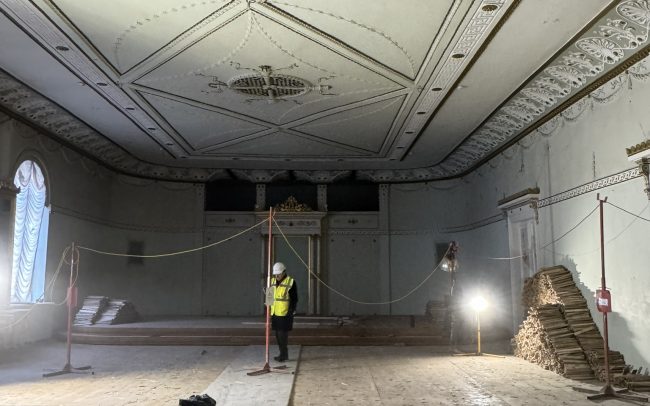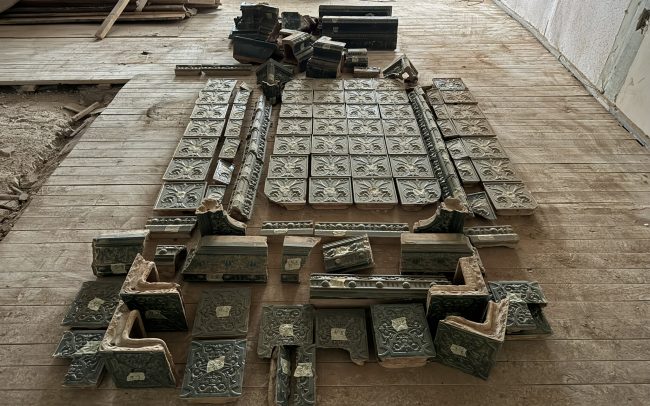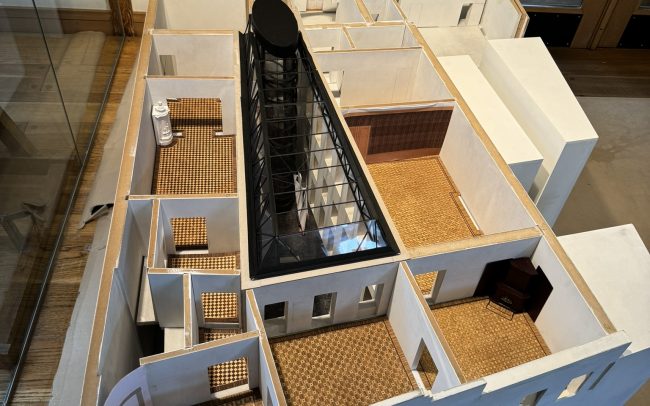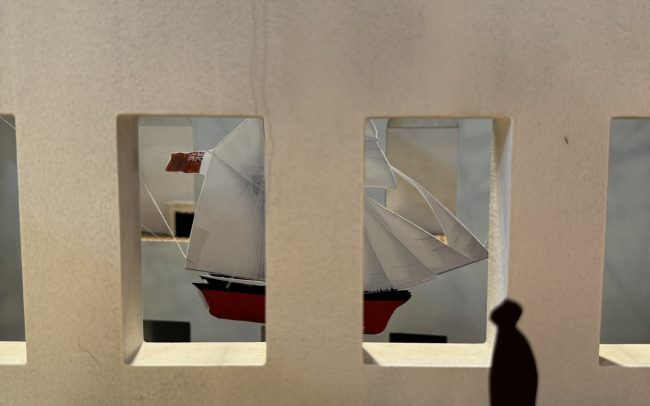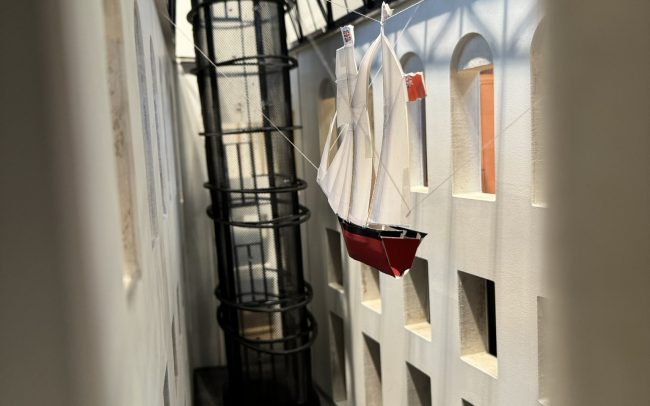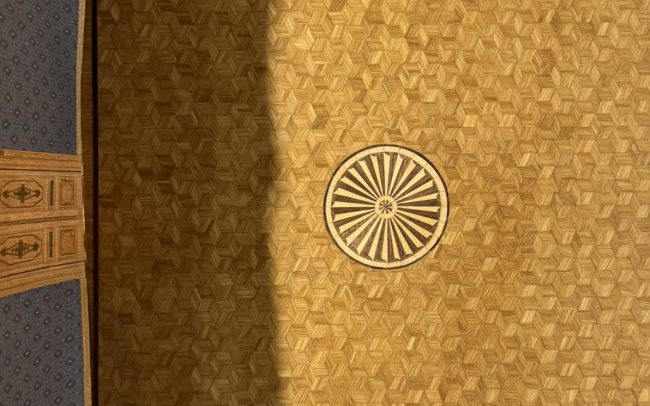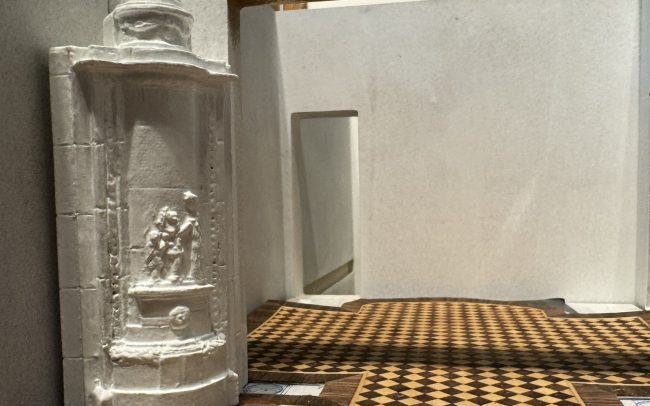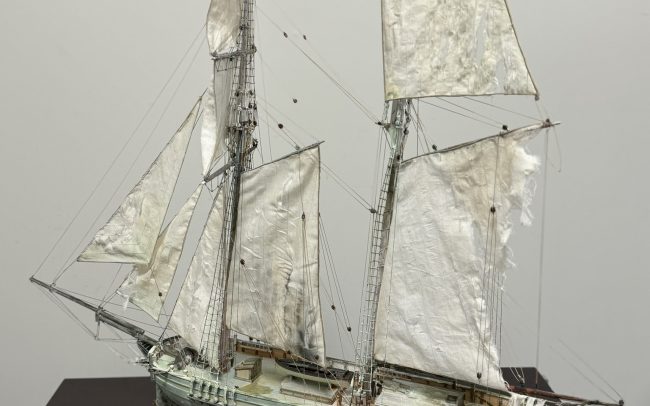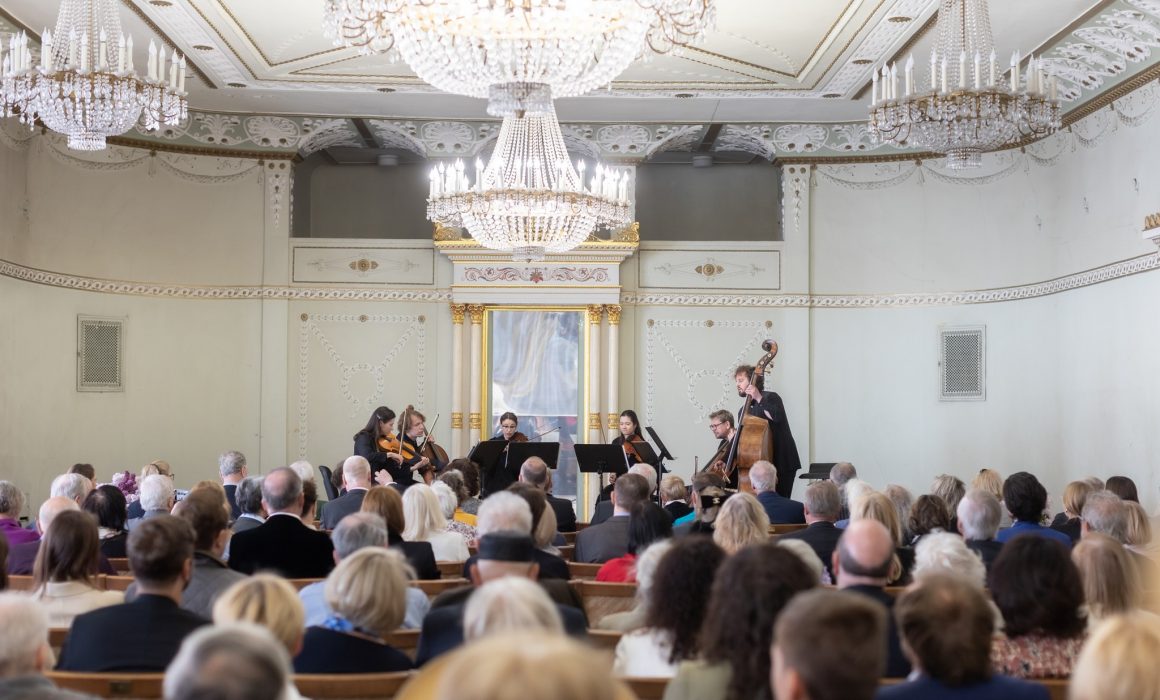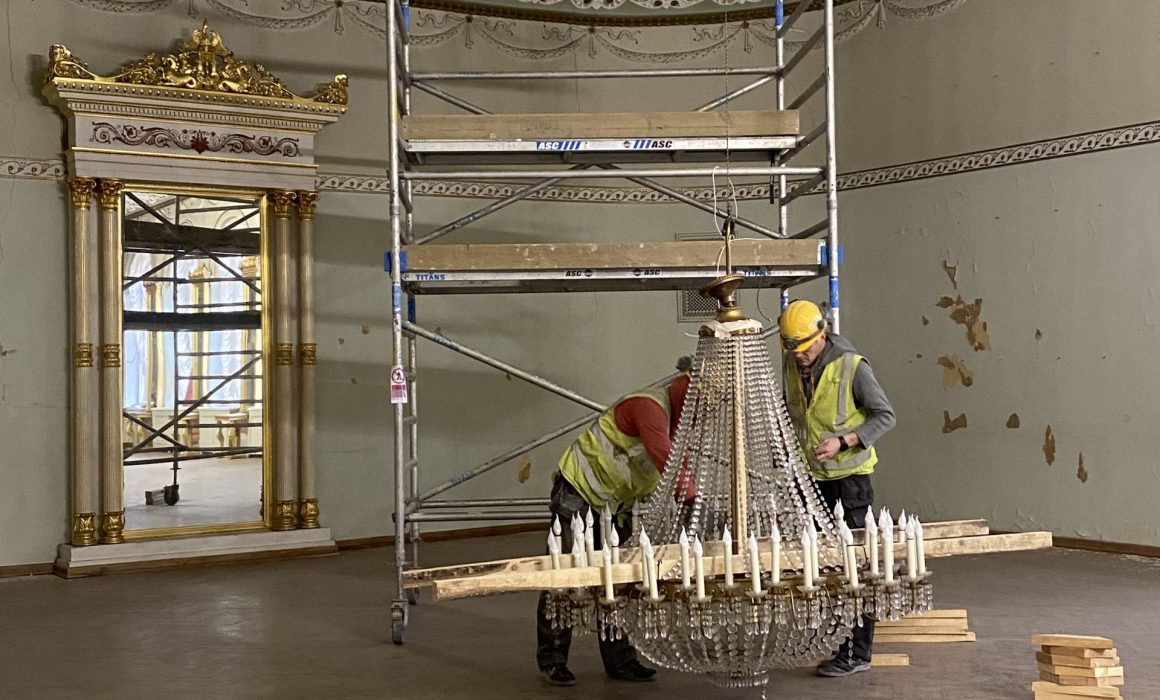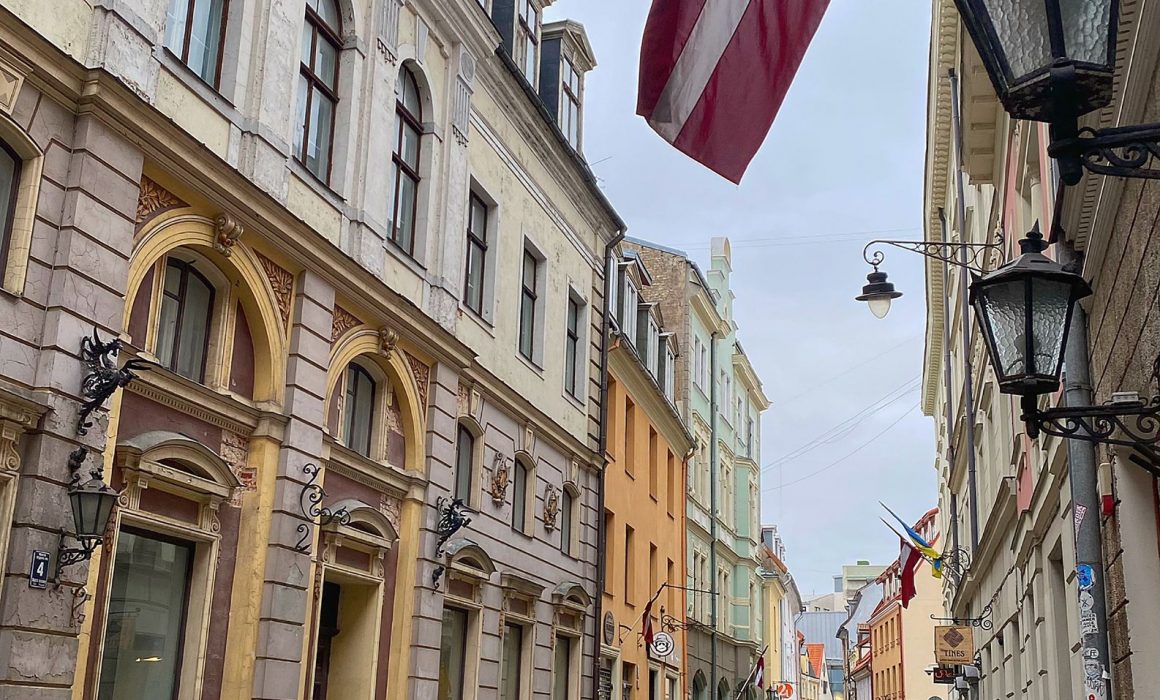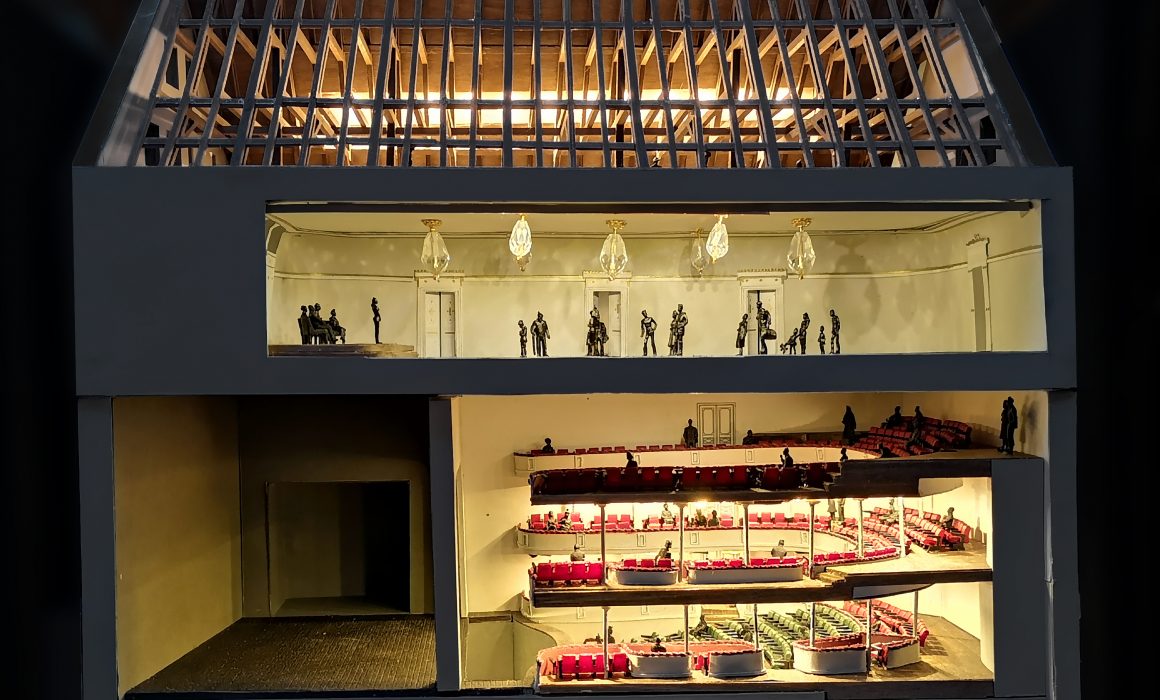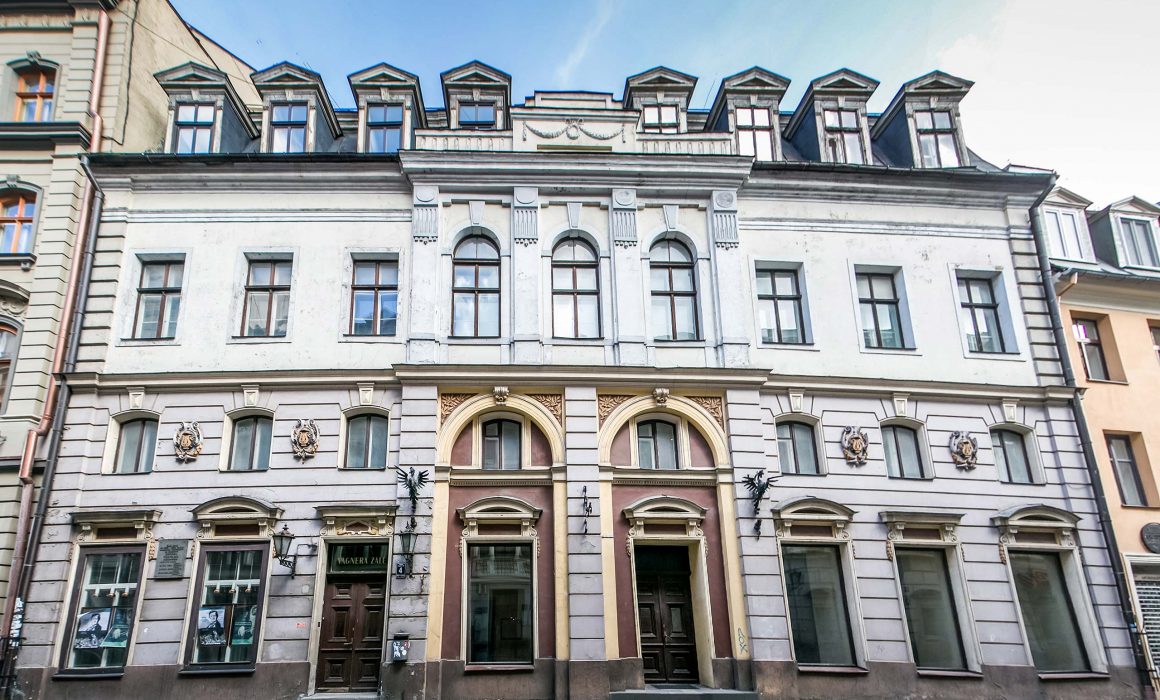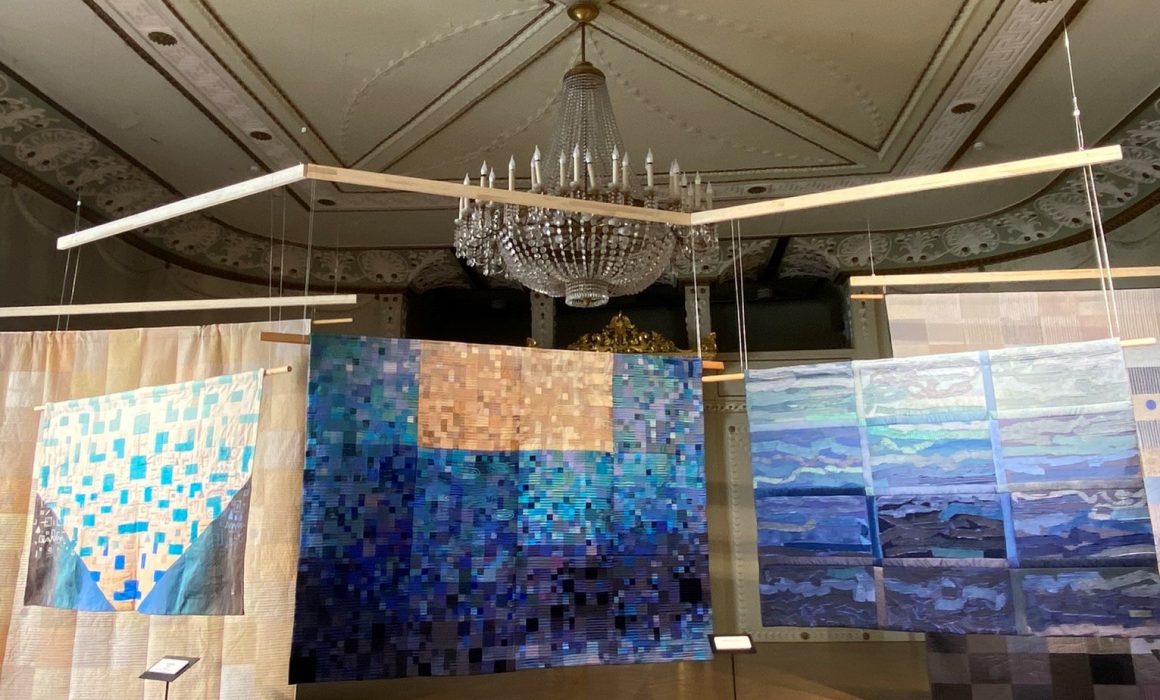Gallery: Richard Wagner’s 211th Birthday Celebration
An open-air piano concerto celebrates Wagner’s 211th birthday
The Riga Richard Wagner Society (RRWS) traditionally invites all citizens and guests of Riga to attend the annual celebration of Richard Wagner’s birthday.
On 22 May at 18:30, a special message from Richard Wagner himself will be played from the stage in front of the theatre building at 4 Vāgnera Street, followed by a short piano concerto by pianist Reinis Zariņš with selected works by Wagner.
The event will be filmed and photographed.
See you there!
Dismantling phase at the Wagner Theatre Completed; Foundation Strengthening to Commence
At the close of last year, the Riga Richard Wagner Society (RRWS) announced the receipt of a building permit for the redevelopment of the Wagner Theatre. With the technical design finalized, the dismantling phase has successfully concluded. Interior detailing is progressing, and the next stage—the commencement of piling works—is imminent.
The dismantling encompassed a wide array of tasks — chandeliers, historic stoves, parquet flooring, windows, doors, and other interior components were carefully removed for refurbishment and subsequent reinstallation in the renovated theatre building. Additionally, partition walls were demolished, and the existing heat network was disassembled, with a temporary system installed to ensure uninterrupted heating for neighboring buildings during the renovation.
Detailing and interior design are an essential part of the project. A 1:30 scale model of the theatre is currently under construction and will be showcased on the third floor, allowing visitors to grasp the intricacies of the structure. Architect Zaiga Gaile elaborated, stating, “The model will be akin to a real doll’s house, featuring original materials like mosaic parquet floors, wooden doors, windows, panels, wallpapered walls, furniture, and even chandeliers.” Notably, a centerpiece of this exhibit will be a meticulously crafted model of the ship “Thetis” from Wagner’s opera The Flying Dutchman, suspended within the glass courtyard above the audience. The ship, discovered in archival records as the vessel Wagner, his wife Minna, and their dog Robert fled on to escape Latvian creditors, will be presented in dramatic detail. Crafted by master modeler Aleksandrs Šarga, the ship will appear as a storm-damaged wreck, complete with torn sails, echoing the tale of The Flying Dutchman. This immersive display, towering at three and a half meters, will captivate visitors as they traverse interconnected rooms of the building’s third floor, studying the ship’s intricate rigging and deck.
Meanwhile, the Wagner Theatre Library is also taking shape, set to dominate the central space along Wagner Street, featuring floor-to-ceiling bookshelves spanning the auditorium’s five-meter-high walls.
Looking ahead, the next phase will focus on strengthening the building’s foundations and constructing the basement. The construction timeline spans three years, with the grand reopening of the Riga Wagner Theatre slated for autumn 2027.
The restoration of the Wagner Theatre will bring a number of significant benefits, which will not only contribute to the diversity and accessibility of cultural events for the people of Latvia, but will also strengthen the image of Riga and Latvia as a cultural centre and the link with Richard Wagner, who was Kapellmeister there for two years (1837-1839). The project will not only renovate the building and the theatre hall, but will also create masterclasses and a Richard Wagner museum. The house will realise Wagner’s vision of “GesamtkunstWerk21″ – an incubator for all art forms that will become an international centre for young artists worthy of the 21st century.
The main contractor for the project is SBSC un 3A, with Sarma un Norde Arhitekti as the main designer, and Būves un Būvsistēmas as the engineer and construction supervisor. Zaiga Gailes birojs” has been hired as a subcontractor for the architectural and interior design. Experts from other countries have also been brought in – for example, theatre technology solutions are being developed by Theater Advies from the Netherlands, while Nagata Acoustics, headed by Yasuhisa Toyota, are acting as consultants on theatre acoustics, having been involved in the design of the Elba Philharmonic and Paris Philharmonic, as well as many other notable projects.
The project “Reduction of greenhouse gas emissions at the Riga Wagner House”, 4 Riharda Wagner Street, Riga, LV-1050, by renovating and restoring the Riga Wagner House” is supported by the Emissions Trading Instrument, the German Ministry of Foreign Affairs, the German Embassy in Riga and the Riga City Council.

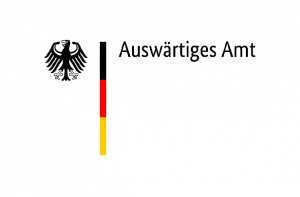


Frankfurt Richard Wagner Society donates €10 000 for the Renaissance of the Wagner Theatre in Riga
The end of the year continues to bring good news for the Riga Richard Wagner Society – we have received a donation of €10 000 from the Richard Wagner Society Frankfurt a. M. (Richard Wagner Verband Frankfurt a. M.).
This is the second time that the Wagner Society Frankfurt has supported the renovation project of the Richard Wagner Theatre in Riga – already at the end of 2021 we received a generous donation, which has contributed significantly to the activities of the Society and the development of the project up to the present moment. We are delighted that representatives of the Frankfurt Wagner Society had the opportunity to witness the laying of the cornerstone of the Wagner Theatre in May this year and to see the theatre that will be reborn thanks in part to their support.
Dirk Jenders, Chairman of the Frankfurt Richard Wagner Society:
The second fundraising campaign organised by the RWV Frankfurt to support the Renaissance of the Richard Wagner Theatre was also a great success. Thanks to the response of the members, the first donation from 2021 was repeated and a few days ago another 10,000 euros were transferred to the Riga Richard Wagner Society.
This strengthening of the cultural bridge between Frankfurt and the Latvian capital is not only an expression of the connection between Wagner fans, but also of solidarity in these difficult times.
After years of preparation, including obtaining expert opinions, launching tenders, analysing cost estimates and raising funds, the project is now undergoing excavation, drilling, demolition and rebuilding of walls and ceilings. So work has started on the theatre, and this marks a very exciting new phase. Every day we are witnessing a vision become reality.
Read the original publication on the Frankfurt Richard Wagner Society website here.
The Renaissance of the Wagner Theatre is also supported by the International Association of Wagner Societies as well as the Wagner Societies in Berlin, Coburg, Freiburg and Minden.
The full list of supporters can be found here: https://vagneriga.lv/sponsors/
Building permit for the renovation of the Wagner Theatre in Riga received
On 24 November, the Riga Richard Wagner Society (RRWS) received confirmation from the Riga City Municipality Urban Development Department – the construction project for the Wagner Theatre building has been approved and a building permit has been received.
Earlier this year, RRVB announced that work had started on the technical design of the Wagner Theatre, and now, at the end of November, the Riga City Council’s Urban Development Department has approved the building permit.
The building has already been handed over to the main builder, SBSC – demolition works are currently underway, the existing heating system is being dismantled, partition walls are being removed, windows, doors and other interior elements are being gently dismantled and will be handed over for restoration. The main construction work, which will start with the strengthening of the foundations, will start in January 2024. The detailed design of the project – planning the interior and restoration work – will continue until February. It is significant that the City Council has taken a positive decision to put the road elements into free use, which is an important contribution to the project, as nearby streets will be used and partly occupied during the construction works.
The restoration of the Wagner Theatre will bring a number of important benefits, not only in terms of the diversity and accessibility of cultural events for the people of Latvia, but also in terms of strengthening the image of Riga and Latvia as a cultural centre and the link with Richard Wagner, who was Kapellmeister at the House for two years (1837-1839). The project will not only renovate the building and the theatre hall, but will also create masterclasses and a Richard Wagner museum. The house will realise Wagner’s vision of “GesamtkunstWerk21″ – an incubator for all art forms that will become an international centre for young artists worthy of the 21st century.
Last year, the main contractor, SBSC, was selected through a public tender process, with Sarma un Norde Arhitekti as the main designer, and Būves un Būvsistēmas SIA as the engineer and construction supervisor. Zaiga Gailes birojs” has been hired as a subcontractor for the architectural and interior design. Experts from other countries have also been brought in – for example, theatre technology solutions are being developed by Theater Advies from the Netherlands, while Nagata Acoustics, headed by Yasuhisa Toyota, are acting as consultants on theatre acoustics, having been involved in the design of the Elba Philharmonic and Paris Philharmonic, as well as many other notable projects.
The project “Reduction of greenhouse gas emissions at the Riga Wagner House”, 4 Riharda Wagner Street, Riga, LV-1050, by renovating and restoring the Riga Wagner House” is supported by the Emissions Trading Instrument, the German Ministry of Foreign Affairs, the German Embassy in Riga and the Riga City Council.




Riga City Council becomes partner of the Wagner Theatre renovation project
On 18 October, the Riga City Council adopted a positive decision on the transfer of road elements for gratuitous use for the implementation of the renovation project of the Richard Wagner Theatre in Riga, at 4 Riharda Vāgnera Street.
The revival of the Wagner Theatre requires a series of large-scale works, and this would of course not be possible without the development of the construction site and the use of nearby streets during the construction works. This usually also means a significant part of the funding going directly to road occupation.
This is an important contribution to the project, and we very much appreciate the city’s support in this journey – in just a few years’ time, the Wagner Theatre will bring together music and art lovers and will become an integral part of Riga’s and Latvia’s culture.
The project “Reduction of greenhouse gas emissions at the “Riga Wagner House”, 4 Riharda Wagner Street, Riga, LV-1050, by renovating and restoring the Riga Wagner House” is supported by the Emission Trading Instrument, the German Ministry of Foreign Affairs, the German Embassy in Riga and Riga City Council.




Riga Wagner Theatre is handed over to the builders
At the beginning of this week, the acceptance and handover act was signed and the Riga Richard Wagner Society (RRVS) has fully handed over the Wagner Theatre to the main contractor, SBSC.
In February this year, it was reported that a total of €20 million had been raised for the renovation of the Wagner Theatre – €15 million from the Emissions Trading Instrument (ETS) and €5 million from the German government. With the funding secured, the project was able to get off the ground; in total, more than €40 million is needed to revitalise the house.
Work is currently continuing on the technical design of the Wagner Theatre – all the main artistic and technical design solutions have been developed, while the restoration and renovation of the building has already been agreed with the National Heritage Office. At the end of July, the building permit for the demolition works was received – the partition walls will be removed, as well as the historic stoves and parquet floors, which will be restored and used in the restored theatre building. The project is scheduled to be submitted to the Riga Construction Board in September.
The vision for the revival of the Wagner Theatre in Riga is to create a beacon of European culture in Riga. Over the next few years, the unique 5000 square metre building ensemble in Old Riga will be renovated and given a new lease of life. The importance of the project is also confirmed by the patrons of the Wagner House restoration project – former President of Latvia Egils Levits, President of the Federal Republic of Germany Frank-Walter Steinmeier, and Eva Wagner-Pasquier, former artistic director of the Bayreuth Festival and great-granddaughter of Richard Wagner.
The restoration of the Wagner House will bring a number of important benefits, not only in terms of the diversity and accessibility of cultural events for the people of Latvia, but also in terms of strengthening the image of Riga and Latvia as a cultural centre and the link with Richard Wagner, who was Kapellmeister at the House for two years (1837-1839). The project will not only renovate the building and the theatre hall, but will also create masterclasses and a Richard Wagner museum. The house will realise Wagner’s vision of “GesamtkunstWerk21″ – an incubator for all art forms that will become an international centre for young artists worthy of the 21st century.
Last year, the main contractor, SBSC, was selected through a public tender process, with Sarma un Norde Arhitekti as the main designer, and Būves un Būvsistēmas SIA as the engineer and construction supervisor. Zaiga Gailes birojs” has been hired as a subcontractor for the architectural and interior design. Experts from other countries have also been brought in – for example, theatre technology solutions are being developed by Theater Advies from the Netherlands, while Nagata Acoustics, headed by Yasuhisa Toyota, are acting as consultants on theatre acoustics, having been involved in the design of the Elba Philharmonic and Paris Philharmonic, as well as many other notable projects.
The project “Reduction of greenhouse gas emissions at the Riga Wagner House”, 4 Riharda Wagner Street, Riga, LV-1050, by renovating and restoring the Riga Wagner House” is supported by the Emissions Trading Instrument, the German Ministry of Foreign Affairs and the German Embassy in Riga.



Cornerstone Ceremony of the Wagner Theatre in Riga on May 21
On Sunday, 21 May, a time capsule ceremony will be held at the Wagner Theatre, symbolically marking the start of the restoration work of the building.
Since 2017, the Riga Richard Wagner Society (RRVS) has been organising flash events on Wagner’s birthday to draw public attention to the need to renovate the Wagner House. This year, the reconstruction of the theatre will finally start and the Society has decided to celebrate the 210th anniversary of Richard Wagner by burying a time capsule in the facade of the building. It will contain various documents and testimonies of the time, including the founding minutes of the RRVB, historical images of the building and current drawings of the project, messages from the patrons of the project, a message from the members to their descendants, as well as a joint message from three generations of Wagnerians – Eva Wagner-Pasquier, her son Antoine Wagner and her granddaughter Daphne Wagner.
The ceremony will be attended and solemn speeches will be made by Māris Gailis, Chairman of the Board of the RRVB, Egils Levits, Patron of the Wagner House restoration project, and Alexander Graf Lambsdorff, Chairman of the German-Baltic Parliamentary Cooperation Group, David Bartels, Deputy Head of Mission of the German Embassy in Latvia, Kerstin von Lingen, President of the Baltic Armour Association, and Rainer Fineske, President of the International Association of Wagner Societies. There will also be a celebratory address by the project’s patron, former artistic director of the Bayreuth Festival, Eva Wagner-Pasquier.
The ceremony will take place in front of the Wagner House, 4 Vāgnera Street, Riga.The artistic design of the event is by the Grāfienes collective – set designers Marianna Lapiņa, Dace Ignatova, Ildze Jurkovska and Justine Jasjukeviča – while the time capsule is by metal artist Uģis Traumanis. After the ceremony, everyone is invited to a short solo concert by the Kremerata Baltica Chamber Orchestra in Wagner Hall.
The last public event at the Wagner House will be the closing concert of the Andrey Osokin Freedom Festival for Ukraine on 10 June. The building will be handed over to the builders for the first light demolition work in July, and the building permit is expected by autumn this year.
Earlier this year, it was announced that €20 million had been raised for the Wagner House renovation project – €15 million from the Emissions Trading Instrument (ETS) and €5 million from the German government. These funds represent half of the total amount needed for the project and will renovate the building to a so-called “grey finish” – the building’s structures will be renovated, the external envelope will be insulated, internal and external networks will be replaced and energy-saving systems will be installed. The technical design of the building was launched in February and is now actively underway. Last year, the main contractor, SBSC, a general partnership with Sarma and Norde Arhitekti as main designers, was selected through a public tender procedure, while the engineering and construction supervision will be carried out by Būves un Būvsistēmas SIA. Zaiga Gailes has been hired as a subcontractor for the architectural and interior design.
The vision of the project is to create a beacon of European culture in Riga. Over the next few years, the unique 5000 square metre building ensemble in Old Riga will be renovated and given a new lease of life. The importance of the project is also confirmed by the patrons of the Wagner House restoration project – Egils Levits, President of Latvia, Frank-Walter Steinmeier, President of the Federal Republic of Germany, and Eva Wagner-Pasquier, former artistic director of the Bayreuth Festival and great-granddaughter of Richard Wagner.
The restoration of the Wagner House will bring a number of significant benefits, not only in terms of the diversity and accessibility of cultural events for the people of Latvia, but also in terms of strengthening the image of Riga and Latvia as a cultural centre and the link with Richard Wagner, who was Kapellmeister at the House for two years (1837-1839).
The project will not only renovate the building and the theatre hall, but will also create masterclasses and a Richard Wagner museum. The house will realise Wagner’s vision of GesamtkunstWerk21 – an incubator for all art forms that will become an international centre for young artists worthy of the 21st century.
Exhibition “The Return” by textile artist Inta Amolina at the Wagner Hall
After more than a decade, textile artist Inta Amoliņa returns with her personal exhibition The Return, which will be on view at Riga Wagner until 29 April, showing visitors the diversity of textile art and highlighting one of its techniques in particular – textile mosaics.
The exhibition will feature eighteen of the artist’s works created between 1992 and 2023, ranging from large bedspreads to wall hangings, and incorporating a variety of textile techniques – batik, embroidery, painting and printing. The exhibition will provide an opportunity to explore this historic and once famous centre of Riga’s cultural life, before the restoration of the Wagner House.
In the mid-20th century, textile mosaics emerged as a unique branch of textile art in Europe, Scandinavia and the United States, alongside crafts. Until the middle of the last century, textile mosaics were not widespread in Latvia (the process of inheritance was missing) and no information about them was available in the local information space. Therefore, the first attempts of textile artist Inta Amoliņa in 1983 to research and interpret the possibilities of the textile mosaic technique in the context of professional textile art are particularly noteworthy. The newly discovered technique became the main form of artistic expression for Ita Amolina, which she skillfully transformed into outstanding textile works and several collections of textile mosaic works. Thanks to her initiative in exploring textile mosaic techniques, this branch of textile art aroused the interest of other Latvian artists. “Textile mosaic is a play with the density, texture, colour, sheen of fabric and its treatment – batik, printing, embroidery, painting. It is a great friendship with fabric and thread,” says Inta Amoliņa.
Nature is her source of inspiration, which is realised in geometric compositions. Some of the textiles on display will be tonal, geometrically saturated works of textile mosaic art that have enriched the Latvian textile art scene for 30 years. The artist’s works are held in the Latvian Artists’ Union Museum, the Museum of Decorative Arts and Design, the Latvian National Museum of Art, as well as other museums and private collections.
Inta Amoliņa was a lecturer at the Fashion Design Department of the Art Academy of Latvia from 1997 to 2018, as well as a jury member of several competitions for young fashion designers and artists. Her work has been exhibited in Belgium, France, Estonia, Great Britain, Lithuania, the Netherlands and Germany.
The exhibition will be on view at Wagner House, Riharda Wagnera iela 4, from 14 to 29 April. Opening hours: Tuesday to Friday: 13.00-18.00
Weekends: 12.00-17.00

